Welcome #FreeBSD 16.0 on my laptop! Smooth, fast, and running perfectly with Xfce.
FreeBSD #Unix #OpenSource #BSD #FreeBSD16 #Xfce #DesktopUnix #Tech #FreeBSDCommunity #FreeBSDLaptop
Welcome #FreeBSD 16.0 on my laptop! Smooth, fast, and running perfectly with Xfce.
FreeBSD #Unix #OpenSource #BSD #FreeBSD16 #Xfce #DesktopUnix #Tech #FreeBSDCommunity #FreeBSDLaptop
Konference o Linuxu, open-source a vším, co s tím souvisí. Koná se každoročně v pražských Dejvicíc na půdě FIT ČVUT v Praze.www.linuxdays.cz
Mixxx 2.5.3 coming up on Haiku 64bit, we're in the process of finetuning the recipe, but so far things are pretty good.
Free and open source DJ software for Windows, macOS, and Linux (and now Haiku too!) :)
#HaikuOS #haikuports #Mixxx #DJ #opensource #software
PR and patch are online atm at: github.com/haikuports/haikupor…
Download the most advanced FREE DJ software available, featuring iTunes integration, MIDI controller support, internet broadcasting, and integrated music library.Mixxx DJ Software
Hurrah! #SOURCE issue 3 is out now! There's a focus on #openhardware for this issue with tutorials on the wonderful @FreeCAD , the mighty @kicad , the fabulous @inkscape and also getting your project certified by the brilliant @oshwassociation. As ever it's pay as you feel, links are on this post concretedog.blogspot.com/2025/… #CAD #CAM #PCB #KiCad #FreeCAD #Inkscape #FreeCadFriday #opensource
Please Boost! and have a great weekend. X
Indeed! It's that time again, I'm incredibly pleased to say that SOURCE issue 3 is out now. This issue's theme is Opensource Hardware and ...concretedog.blogspot.com
The European Commission has issued a survey ✍️ on the Governance and #Sustainability of Critical Open Source #Software. Your input is highly beneficial for identifying best practices, shared needs, and possible pathways for collective efforts 🎯, as well as for translating them into actionable #recommendations for public administrations both at national and EU level. 🤓
It's a relatively short survey, takes maximum 15 min to complete. Deadline: 5 Oct 2025.
👉 ec.europa.eu/eusurvey/runner/F…
EUSurvey is an online survey-management system built for the creation and publishing of globally accessible forms, such as user satisfaction surveys and public consultations.ec.europa.eu
Love LibreOffice development? Want to turn your passion into a paid job? We are The Document Foundation (TDF), the non-profit entity behind LibreOffice.Ilmari Lauhakangas (The Document Foundation)
Konference o Linuxu, open-source a vším, co s tím souvisí. Koná se každoročně v pražských Dejvicíc na půdě FIT ČVUT v Praze.www.linuxdays.cz
Like we’re seeing in Schleswig-Holstein, Denmark and many other government bodies and organisations, the Austrian military (Bundesheer) has migrated 16,000 PCs from Microsoft Office to LibreOffice.Mike Saunders (The Document Foundation)
Fifteen years ago, we announced our ambitious plan to provide the world with a fully free and open office suite created by and for the community.Italo Vignoli (The Document Foundation)
Beeindruckend finde ich den lebendigen und vielfältigen Austausch in den #Matrix Räumen von @librechurch@kirche.social auf synod.im
Von Fragen und Ideen zu digital souveränen Tools, die auf dem Marktplatz diskutiert werden bis zu Erfahrungen und Herausforderungen immer kleiner werdender christlicher Gemeinden im Raum Glauben teilen.
📣 The Jami team is proud to present Atlas: our biggest step toward reliable communication. 🌐⚡
Groundbreaking improvements to connectivity & delivery, even in complex networks.
🔗 Full article : jami.net/atlas-jamis-biggest-s…
#Jami #OpenSource #P2P #PrivacyMatters
Today, we are releasing Atlas: the latest Jami update that rolls months of engineering into visible gains you can feel in daily use.jami (Jami)
In this month's Dev Digest, we're:
* describing the final QA steps as Exchange mail support lands in 144
* discussing future Exchange work
* adding Exchange to Account Hub
* recapping the Conversation View workweek
* diving back into the Calendar UI Rebuild
* and more!
blog.thunderbird.net/2025/09/t…
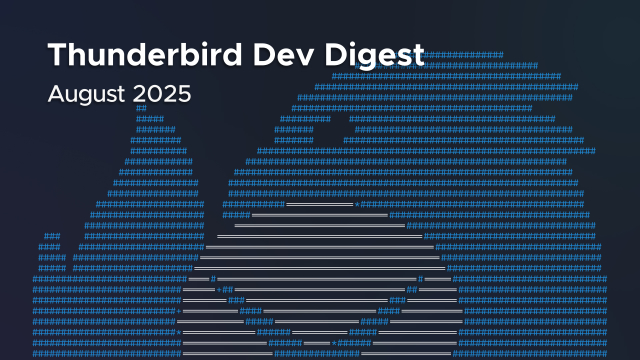
Exchange is coming to Thunderbird 144 next month! Learn what's in and what's planned. Also, updates on Account Hub, Calendar UI, and more!Toby Pilling (The Thunderbird Blog)
ive created a draft within pmOS to try and get an open letter going: gitlab.postmarketos.org/postma…
will be useful if other open source/foss projects signed on
#OpenSource #linux #linuxmobile #PostmarketOS

Background The EU is allocating a €2 trillion investment "to boost autonomy, competitiveness, and resilience" by "address[ing] cybersecurity, innovation, and other...GitLab
In-person and virtual community initiatives, adjusting the Android roadmap, and the journey to true Conversation View and why it's hard, and how an in-person work week helped us get started. Read/watch/listen at the blog:
blog.thunderbird.net/2025/09/s…
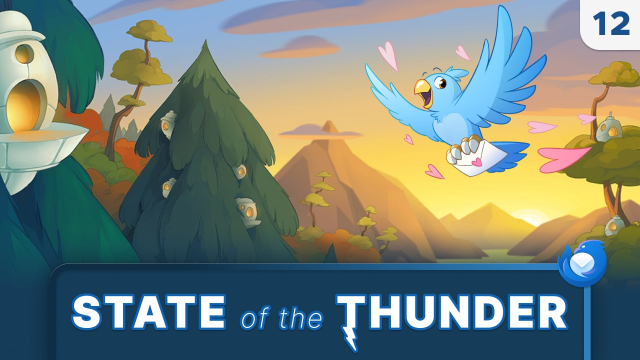
We’re back with our twelfth episode of the State of the Thunder! In this episode, we’re talking about community initiatives, filling you in on Android development, and finishing our updates on popular Mozilla Connect requests.Monica Ayhens-Madon (The Thunderbird Blog)
Updates from the Nepalese LibreOffice community: Recent protests and stress in Nepal have disrupted regular activities. Almost everything was affected, including in-person events being canceled rapidly.Mike Saunders (The Document Foundation)
Windows 10 support ends on October 14.
Help the people around you continue to be protected by helping them switch to Linux. They don't need to go buy a new computer just because Microsoft made a decision for them.
Follow @Endof10 for success stories and resources for how to help people switch!
Learn more: endof10.org
#EndOf10 #Linux #OpenSource #Fedora
Axonometric grids, contextual layer actions, polygon selection tool and more are available to test in Pinta 3.1 Beta.
omgubuntu.co.uk/2025/09/pinta-…
#opensource #Design #tech
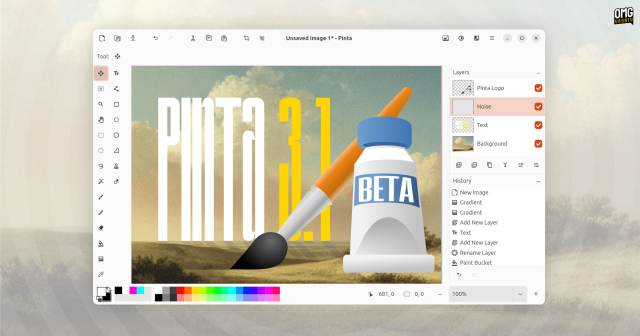
A beta version of Pinta 3.1 is available for testing. The fee open source image editor adds axonometric grid, polygon selection, performance improvements and more.Joey Sneddon (OMG! Ubuntu!)
Today we’re talking to Devansh Varshney, who added histogram chart support to LibreOffice and is working on improvements to the Basic IDE… Tell us a bit about yourself! I am from Mathura in India, one of the historical cities where the first image of…Mike Saunders (The Document Foundation)
The Open Source Conference 2025 will take place the 1st of October 2025 in Belval, Esch-sur-Alzette, Luxembourg, following a very successful first edition in 2024 in combination with the LibreOffice Conference.Italo Vignoli (The Document Foundation)
The old web was decentralized:
- Newsgroups
- Personal Websites
- Bulletin board
- Email as a service, not a platform
- Internet relay chat (IRC)
- Early blogs
Then corporations arrived with money and lock-in, turning the internet into centralized ad farms (Meta, X, TikTok). Users became consumers, trapped in algorithms, tracking, and enshittification. Revenue more important than people.
The Fediverse is a way back: no ads, no algorithms, no dark patterns. People first. A web worth reclaiming. And open source is the engine of this transformation.
Take back the web. Decentralize again 💪 Bring people to the Fediverse, promote open source and build federated services.
#TakeBackTheWeb #Decentralized #Fediverse #StopBigTech #OpenSource #DeGoogle #UnplugTrump
Push-Benachrichtigungen auf Android-Handys ohne Google. Dezentralisiert und Open Source.
Mit Open Source Tools wie microG bekommt man zwar erfolgreich proprietäre Google Software von seinem Android-Handy verbannt; die eigentlichen Benachrichtigungen werden aber dennoch über Google Server verschickt (Firebase Cloud Messaging).
UnifiedPush ist ein Framework, mit dem Push-Benachrichtigungen dezentral bzw über selbst betriebene Server zugestellt werden können. Zahlreiche Open Source Android Apps unterstützen bereits UnifiedPush. Unter anderem: Tusky, Fedilab, DAVx⁵, Fennec, Element (mit Einschränkungen) und viele mehr.
Dieser Vortrag erklärt, wie Push-Benachrichtigungen im Allgemeinen funktionieren und warum sie trotz ihres eventuell schlechten Rufes eleganter sind, als jede App eine eigene Serververbindung aufbauen zu lassen.
Des Weiteren werden mögliche Privacy-Probleme erörtert die mit der Benutzung von Google Push Servern einhergehen.
Anschließend wird die Architektur von UnifiedPush erklärt.
Der Vortrag endet mit einer praktischen Anleitung wie man UnifiedPush auf einem Android-Handy benutzt.
My Hero of the Day is @valadaptive@github.com, who came out of nowhere and, just like that, deleted 11K lines of FontForge legacy code.
After the initial shock and dismay, the rather conservative board eventually agreed, and today her PR was merged 🚀
github.com/fontforge/fontforge…
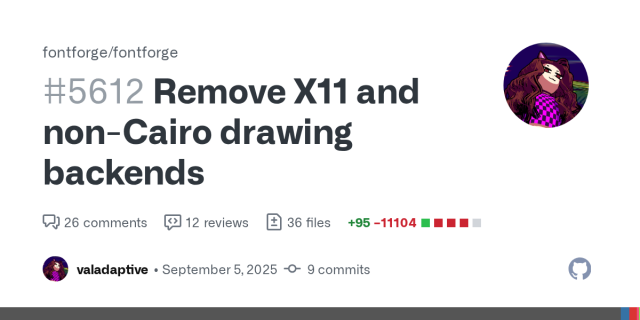
Resolves #5611 by just removing support for the X11 backend entirely. If the eventual goal is to implement everything in GTK, we can remove some X11-exclusive code and get rid of quite a bit of cru...GitHub
The XMPP Newsletter for August 2025 is out!
Read about the latest updates in the #XMPP universe and our #standards!
xmpp.org/2025/09/the-xmpp-news…
Enjoy reading! 📰 ☕ 
#jabber #chat #interoperability #rtc
#opensource #decentralization #federation #messaging #newsletter
Itching to try GNOME 49 today? Developers and curious testers can try GNOME OS in a virtual machine or bare metal:
Just remember that GNOME OS itself is considered pre-release software; bad things may happen if you use it in production. Happy testing!
#GNOME #OpenSource #FLOSS #FOSS #Linux
Thank you to everyone who helped make GNOME 49 a reality—especially every Friend of GNOME whose financial support sustains the GNOME Foundation!
If you'd like to join us on the road to GNOME 50, consider donating to become a Friend of GNOME today. With your help, we can continue to build a diverse and sustainable free software personal computing ecosystem to realize a world where everyone is empowered by technology they can trust.
#GNOME #OpenSource #FLOSS #FOSS #Linux
GNOME 49 has been officially released! Head over to the release notes to discover all the new features and enhancements:
Many thanks to our community for your work over the past 6 months. You're amazing!
#GNOME #OpenSource #FLOSS #FOSS #Linux
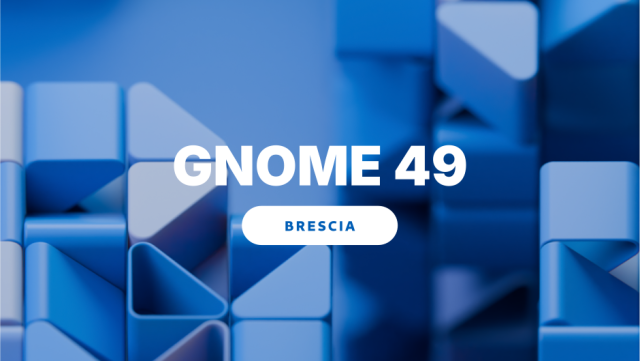
Discover what's new in GNOME, the distraction-free computing platform.GNOME Release Notes
At last, all the accessibility improvements on GNOME Calendar are finally available as a stable release. Get it on Flathub while it's hot!!!
flathub.org/en/apps/org.gnome.…
#Accessibility #GNOME #GTK #GTK4 #libadwaita #a11y #calendar #GNOMECalendar #Linux #GNU #OpenSource #FOSS #FreeSoftware #OSS

There is no calendaring app that I love more than GNOME Calendar. The design is slick, it works extremely well, it is touchpad friendly, and best of all, the community around it is just full of wonderful developers, designers, and contributors worth …TheEvilSkeleton
Companies around the world use LibreOffice to reduce costs, improve their privacy, and free themselves from dependence on single vendors.Mike Saunders (The Document Foundation)

Unfortunately, I've mostly lost interest and motivation to work on Helvum, so the project has already been inactive for over a year. I am now marking...GitLab
Welches lokal und datenschutzfreundlich nutzbare #LLM möchte man denn installieren, um das #Foto #Archiv mit #Bildbeschreibungen zu versehen.
Daraus möchte ich eine eigene #Datenbank bauen.
Und nein, ich möchte keine Fotoverwaltungssoftware installieren.
General Activities LibreOffice 25.8.0 and LibreOffice 25.8.1 were announced on August 20 and August 29 respectively Olivier Hallot (TDF) updated help for the option to load printer settings with document, sorting blocks of cells in Calc, hyphenation,…x1sc0 (LibreOffice QA Blog)
Recently we've been thinking about how we share code (and other design files) for our #OpenSource projects and products.
@amcewen has written about the flaws in centralized options like Github and Gitlab, and why self-hosting isn't the answer.
Maybe we need some #CodeCommons?
mcqn.com/posts/code,-sharing-a…
#OSHW #git #Github #commons #weeknotes
Hello. Adrian here. Over the past few months, off and on, I’ve been thinking about version control. As a company that writes lots of software, it’s a pretty central tool for managing source code...mcqn.com
We've got the latest updates on our Android and upcoming iOS apps! Take a sneak peak at the new Android account drawer, iOS account setup and upcoming monthly release schedule. Also, we explain why recent updates affected read/unread message readability and how we're fixing it in the short AND long term.
blog.thunderbird.net/2025/09/m…
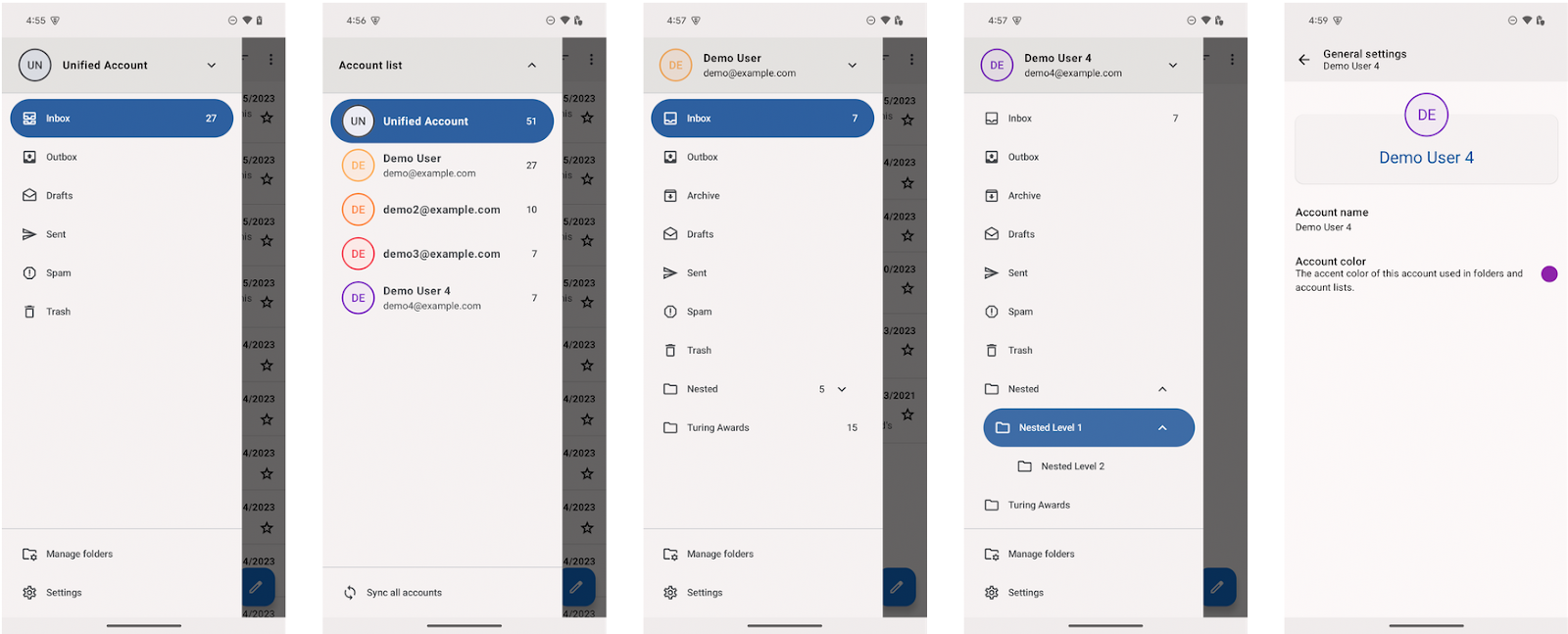
Mobile Progress Report is back with updates on the Android drawer and visual improvements, iOS mockups, and a new monthly release cadenceAlessandro Castellani (The Thunderbird Blog)
The Annual Report of The Document Foundation describes the foundation’s activities and projects, especially in regard to LibreOffice and the Document Liberation Project.Italo Vignoli (The Document Foundation)
Einblicke in das #Datenspuren-Programm
Heute: #UnifiedPush
talks.datenspuren.de/ds25/talk…
Push-Benachrichtigungen auf #Android-Handys ohne #Google. Dezentralisiert und #OpenSource. Wie das geht, berichtet @daniel in seinem Vortrag auf den #Datenspuren25.
Wann? 20. September, 16:00–16:45 Uhr
Wo? Henny Brenner Saal und im Stream auf @mediacccde
Ihr wollt euch das komplette Programm ansehen? Dann schaut hier vorbei: talks.datenspuren.de/ds25/sche…
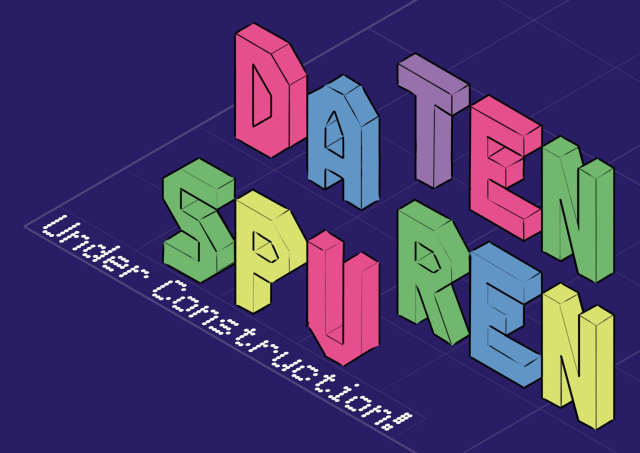
Push-Benachrichtigungen auf Android-Handys ohne Google. Dezentralisiert und Open Source.talks.datenspuren.de